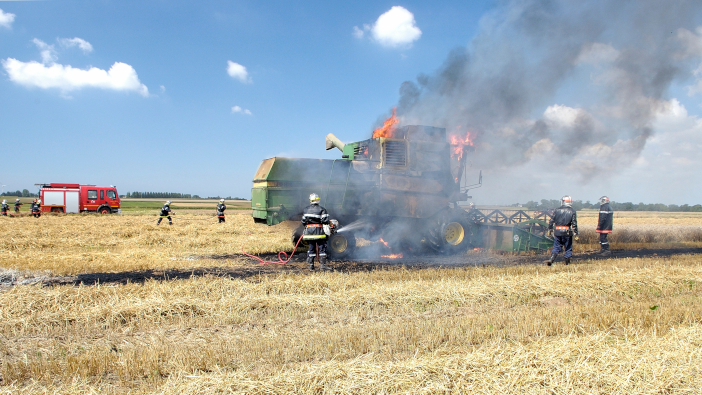Rural insurer NFU Mutual is urging farmers to put new fire prevention and control plans in place as the cost of on-farm fires have shot up a staggering 40% to over £69 million last year.
According to the insurer, electrical faults were a major cause of farm fires in 2020. Extreme weather and dry conditions also contributed to the huge cost of fires last year.
Fire spreading from electrical cabinets underlined the importance of regular inspections by competent professionals, in addition to regular dust-downs and ensuring clear space around control panels.
An alarming new trend was fires involving biomass boilers as farmers look to alternative fuel sources. The NFU Mutual said that a system of servicing and maintenance, along with good housekeeping and waste disposal procedures can help to mitigate these risks.
Agricultural vehicle fires accounted for an additional £20 million during 2020. Fires writing off combine harvesters, which can cost up to £850,000, prompted the insurer to encourage farmers to fit accredited fire suppression systems with discounted agricultural vehicle premiums to help lives and property.
Evita Van Gestel of NFU Mutual Risk Management Services Ltd works with farmers across the UK to help reduce the risks in their fields and farmyards. She said: “It’s vitally important to have an emergency plan in place to protect everyone who might live on, work at and visit the farm.
“Farm fires put lives at risk as well as causing devastating damage and putting the future of farm businesses under threat.
“Farmers are currently under huge pressure to keep the country fed and adapt their businesses to changes in agriculture, so regularly reviewing your fire risk assessment and acting on your findings is vital to reduce the risk of seeing the fruits of your hard work going up in smoke.
“Most fires are preventable by carrying out routine maintenance and inspection on heating systems, electrical installations and machinery, and controlling hot works within farm workshops. Implementing and maintaining good standards of housekeeping, particularly around the storage of combustibles and flammables such as hay, straw and fuels, will also reduce the risk of a fire spreading. Some insurance policies, for instance, NFU Mutual’s Poultry Farm Warranty, will have mandatory requirements relating to electrics and ventilation.”
The cost and number of farm fires rose significantly. The East was the worst affected region by cost in 2020, totalling £21.5 million. Northern Ireland was the second, with claims reaching £14.7 million (up from £2.7 million in 2019), followed by the South West where the total was £8 million (up from £5.9 million in 2019).
Five fire safety tips from NFU Mutual Risk Management Services
- Have a plan in place – Put people at the heart of your fire plan and ensure everyone on site knows what to do in the event of a fire. The biggest priority is to evacuate everyone safely including people working in or living around the premises, particularly those especially at risk and who may have disabilities.
- Don’t mess with electrics – Electrical faults are a major cause of fire whilst electric shock can cause death or severe injury. Don’t try and attempt electrical work yourself and always use a qualified and competent electrician for work and inspections. DIY modifications, hostile conditions (such as wet, damp or acidic atmospheres), rodents, overloaded sockets and simple wear and tear are common causes of electrical fires on farms.
- Suppress the risk – suppression systems are a major game changer for the industry and play a critical role detecting, containing and extinguishing fire. Whether you have a biomass boiler or a combine harvester, working in hot, dry conditions, fire suppression systems can save lives and property.
- Keep on top of your housekeeping – Good housekeeping is absolutely essential to ensure materials and machinery are stored correctly and to eliminate dust and debris. The build-up of waste and materials is not only flammable and potentially explosive, it can block escape routes and cause trip hazards in an emergency.
- Control hot work – Welding, cutting or grinding equipment, along with blow lamps and blow torches can produce sparks which spread quickly. If work can’t be done outside, ensure you are in clear, open area and far away from combustible materials. Anyone carrying out hot works on your farm should be subject to a strict ‘Permit to Work’ system.
NFU Mutual farm fire claims cost by area (to the nearest £100,000)
| Region | 2020 | 2019 | % change |
| East | £21,500,000 | £7,000,000 | 209.4% |
| Midlands | £5,200,000 | £13,000,000 | -61% |
| North East | £7,700,000 | £7,600,000 | 2.1% |
| North West | £1,100,000 | £1,600,000 | -30.4% |
| Northern Ireland | £14,700,000 | £2,700,000 | 445.5% |
| Scotland | £3,300,000 | £2,800,000 | 19% |
| South East | £5,400,000 | £5,000,000 | 7% |
| South West | £8,000,000 | £5,900,000 | 35.8% |
| Wales | £2,100,000 | £3,200,000 | -35.2% |
| Total | £69,000,000 | £49,100,000 | 40.5% |
If a fire breaks out:
- Call the Fire and Rescue Service without delay.
- Only attempt to fight the fire if it is safe to do so and using the correct and maintained extinguishers.
- Prepare to evacuate livestock, only if safe to do so if the fire spreads.
- Prepare to use farm machinery to assist the Fire and Rescue Service.
- Ensure you can direct emergency services to the exact location of fires e.g. download the what3words app which pinpoints specific 3m x 3m locations
- Send someone to meet and direct the Fire and Rescue Service to the fire.
- Ensure the farm entrance is clearly signed and access kept clear to allow Fire and Rescue Service access.


